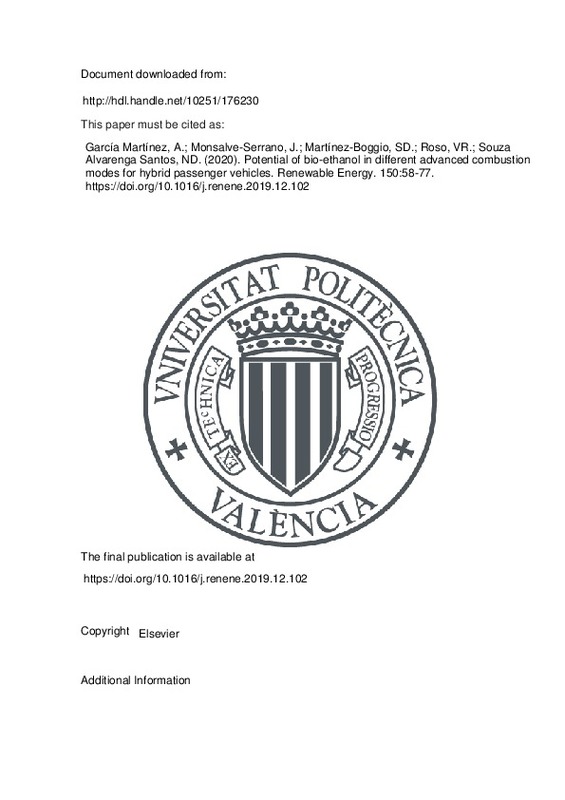JavaScript is disabled for your browser. Some features of this site may not work without it.
Buscar en RiuNet
Listar
Mi cuenta
Estadísticas
Ayuda RiuNet
Admin. UPV
Potential of bio-ethanol in different advanced combustion modes for hybrid passenger vehicles
Mostrar el registro sencillo del ítem
Ficheros en el ítem
| dc.contributor.author | García Martínez, Antonio
|
es_ES |
| dc.contributor.author | Monsalve-Serrano, Javier
|
es_ES |
| dc.contributor.author | Martínez-Boggio, Santiago Daniel
|
es_ES |
| dc.contributor.author | Roso, Vinicius Ruckert
|
es_ES |
| dc.contributor.author | Souza Alvarenga Santos, Nathalia Duarte
|
es_ES |
| dc.date.accessioned | 2021-11-05T14:06:14Z | |
| dc.date.available | 2021-11-05T14:06:14Z | |
| dc.date.issued | 2020-05 | es_ES |
| dc.identifier.issn | 0960-1481 | es_ES |
| dc.identifier.uri | http://hdl.handle.net/10251/176230 | |
| dc.description.abstract | [EN] The strong new restrictions in the vehicle CO2 emissions together with the instability of the fossil fuels reserves reinforces the necessity to continue developing high efficiency combustion engines that operate with renewable energy sources. Bio-ethanol appears as a potential fuel to replace well-established fossil fuels, such as gasoline, due to the overall carbon neutral emission. In addition, the high-octane number allows to increase the compression ratio of the engine to improve the thermal efficiency. Apart from the CO2, the emissions legislation restricts the NOx and particle matter emissions to ultra-low values, and they will continue decreasing down to almost zero. In this work, two advanced dual-fuel combustion modes using bio-ethanol as main fuel are studied. A pre-chamber ignition system (PCIS) using bio-ethanol and hydrogen, and a reactivity-controlled compression ignition (RCCI) combustion mode operating with bio-ethanol/diesel was selected due to the potential to reduce NOx emissions. These combustion technologies were studied by a numerical 0-D vehicle simulations in homologation and real-life driving cycles for a range extender hybrid powertrain. As a baseline, the original manufacturer spark ignition (SI) no-hybrid powertrain fueled with pure bio-ethanol was used. The powertrain components and control system were optimized to obtain the maximum overall vehicle efficiency, and low CO2-NOx emissions. Finally, a life cycle analysis (LCA) was performed to study the global potential of the bio-ethanol to reduce greenhouse gas (GHG) emissions. A battery electric vehicle (BEV) and a gasoline SI no-hybrid vehicle were added for comparison. The results show that the RCCI mode presents the highest potential to reduce the NOx emissions. However, the PCIS allows to reduce the tank to wheel CO2 emissions up to 60 g/km when high rates of H2 are used. The LCA-GHG for the vehicles using bio-ethanol is 50% and 95% lower than a BEV and SI-gasoline vehicle, respectively. | es_ES |
| dc.description.sponsorship | The authors acknowledge FEDER and Spanish Ministerio de Economia y Competitividad for partially supporting this research through TRANCO project (TRA2017-87694-R). The authors also acknowledge the Universitat Politecnica de Valencia for partially supporting this research through Convocatoria de ayudas a Primeros Proyectos de Investigacion (SP20180148). The authors also acknowledge CAPES and the Post-Graduation Program in Mechanical Engineering at UFMG-Brazil for the support provided. | es_ES |
| dc.language | Inglés | es_ES |
| dc.publisher | Elsevier | es_ES |
| dc.relation.ispartof | Renewable Energy | es_ES |
| dc.rights | Reserva de todos los derechos | es_ES |
| dc.subject | Pre-chamber | es_ES |
| dc.subject | RCCI | es_ES |
| dc.subject | Bio-ethanol | es_ES |
| dc.subject | Hybrid powertrain | es_ES |
| dc.subject | Emissions regulations | es_ES |
| dc.subject | Driving cycles | es_ES |
| dc.subject.classification | MAQUINAS Y MOTORES TERMICOS | es_ES |
| dc.title | Potential of bio-ethanol in different advanced combustion modes for hybrid passenger vehicles | es_ES |
| dc.type | Artículo | es_ES |
| dc.identifier.doi | 10.1016/j.renene.2019.12.102 | es_ES |
| dc.relation.projectID | info:eu-repo/grantAgreement/AEI/Plan Estatal de Investigación Científica y Técnica y de Innovación 2013-2016/TRA2017-87694-R/ES/REDUCCION DE CO2 EN EL TRANSPORTE MEDIANTE LA INYECCION DIRECTA DUAL-FUEL DE BIOCOMBUSTIBLES DE SEGUNDA GENERACION/ | es_ES |
| dc.relation.projectID | info:eu-repo/grantAgreement/UPV-VIN//SP20180148//Estudio del potencial de la combustión Dual-Fuel Gas Natural/Diesel para la reducción de las emisiones de CO2 en vehículos destinados al transporte por carretera (DUGAS)/ | es_ES |
| dc.rights.accessRights | Abierto | es_ES |
| dc.contributor.affiliation | Universitat Politècnica de València. Departamento de Máquinas y Motores Térmicos - Departament de Màquines i Motors Tèrmics | es_ES |
| dc.description.bibliographicCitation | García Martínez, A.; Monsalve-Serrano, J.; Martínez-Boggio, SD.; Roso, VR.; Souza Alvarenga Santos, ND. (2020). Potential of bio-ethanol in different advanced combustion modes for hybrid passenger vehicles. Renewable Energy. 150:58-77. https://doi.org/10.1016/j.renene.2019.12.102 | es_ES |
| dc.description.accrualMethod | S | es_ES |
| dc.relation.publisherversion | https://doi.org/10.1016/j.renene.2019.12.102 | es_ES |
| dc.description.upvformatpinicio | 58 | es_ES |
| dc.description.upvformatpfin | 77 | es_ES |
| dc.type.version | info:eu-repo/semantics/publishedVersion | es_ES |
| dc.description.volume | 150 | es_ES |
| dc.relation.pasarela | S\400102 | es_ES |
| dc.contributor.funder | AGENCIA ESTATAL DE INVESTIGACION | es_ES |
| dc.contributor.funder | European Regional Development Fund | es_ES |
| dc.contributor.funder | UNIVERSIDAD POLITECNICA DE VALENCIA | es_ES |
| dc.contributor.funder | Universidade Federal de Minas Gerais | es_ES |
| dc.contributor.funder | Coordenaçao de Aperfeiçoamento de Pessoal de Nível Superior, Brasil | es_ES |







![[Cerrado]](/themes/UPV/images/candado.png)

